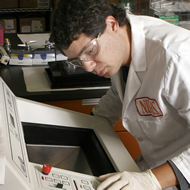
Environmental Factor, December 2008, National Institute of Environmental Health Sciences
ADHD Medications Do Not Cause Genetic Damage in Children
By Robin Mackar
December 2008

In contrast to recent findings, two of the most common medications used to treat attention deficit hyperactivity disorder (ADHD) do not appear to cause genetic damage in children who take them as prescribed, according to a new study by researchers at the National Institutes of Health (NIH) and Duke University Medical Center.
The study (http://www.ncbi.nlm.nih.gov/pubmed/18978633?ordinalpos=1&itool=EntrezSystem2.PEntrez.Pubmed.Pubmed_ResultsPanel.Pubmed_DefaultReportPanel.Pubmed_RVDocSum) ![]() published online this month in the Journal of the American Academy of Child and Adolescent Psychiatry (JAACAP) provides new evidence that therapeutic doses of stimulant medications, such as methylphenidate and amphetamine, do not cause cytogenetic (chromosomal) damage in humans. The researchers looked at three measures of cytogenetic damage in white blood cells of each child participating in the study and found no evidence of any changes after three months of continuous treatment.
published online this month in the Journal of the American Academy of Child and Adolescent Psychiatry (JAACAP) provides new evidence that therapeutic doses of stimulant medications, such as methylphenidate and amphetamine, do not cause cytogenetic (chromosomal) damage in humans. The researchers looked at three measures of cytogenetic damage in white blood cells of each child participating in the study and found no evidence of any changes after three months of continuous treatment.
“This is good news for parents,” said Kristine Witt, a genetic toxicologist at the NIEHS/National Toxicology Program (NTP) and co-author on the study, which was funded through the Best Pharmaceuticals for Children Act by NIEHS and the Eunice Kennedy Shriver National Institute of Child Health and Human Development (NICHD). “Our results indicate that methylphenidate- and amphetamine-based products do not induce cytogenetic damage in children.”
The researchers involved emphasize that the findings should not be interpreted as final proof of the long-term safety of stimulant drugs for the treatment of ADHD. “More research and close monitoring of children taking these medications for extended periods of time is needed to fully evaluate the physical and behavioral effects of prolonged treatment with stimulants,” noted Scott Kollins, Ph.D., co-author of the paper and director of the Duke ADHD Program, where the study was conducted.
ADHD is a disorder characterized by attention problems, impulsivity, and hyperactivity. About 3 to 5 percent of children in the United States have been diagnosed with the disorder, although several studies suggest 7 to 12 percent of children may be affected.
The current study included 63 children, ranging from 6–12 years of age, who met full criteria for ADHD but who had not previously been treated with stimulant medications. Children in the study were divided into two groups and treated by a board-certified child psychiatrist with either methylphenidate (commercially available as Ritalin LA and Concerta) or with mixed amphetamine salts (Adderall and Adderall XR). Blood samples were taken before the medication was started to establish baseline values for the cytogenetic measures that were analyzed in the study, and a second sample was collected after three months of continuous treatment. Forty-seven children completed the full three-month treatment schedule.
The researchers found no significant differences between the two groups of children with regard to age, gender, race, body weight, height, or ADHD subtype. The groups also showed very similar ADHD symptom levels at initial screening and children in both groups responded equally well to the medication.
The study was designed to determine the reproducibility of findings from a previously published paper that reported methylphenidate-induced chromosomal changes in children with ADHD. The current study was not able to replicate the findings from the previous study. The new JAACAP paper extends the literature by using a larger sample size than previous studies, investigating more than one commonly prescribed medication and providing well-characterized results that can be generalized to other ADHD populations.
Citation: Witt KL, Shelby MD, Itchon-Ramos N, Faircloth M, Kissling GE, Chrisman AK, Ravi H, Murli H, Mattison DR, Kollins SH. (http://www.ncbi.nlm.nih.gov/pubmed/18978633?ordinalpos=1&itool=EntrezSystem2.PEntrez.Pubmed.Pubmed_ResultsPanel.Pubmed_DefaultReportPanel.Pubmed_RVDocSum) ![]() 2008. Methylphenidate and amphetamine do not induce cytogenetic damage in lymphocytes of children with ADHD. J. Am. Acad. Child Adolesc. Psychiatry 47(12):DOI 1375Y1383.
2008. Methylphenidate and amphetamine do not induce cytogenetic damage in lymphocytes of children with ADHD. J. Am. Acad. Child Adolesc. Psychiatry 47(12):DOI 1375Y1383.
(Robin Mackar is the News Director in the NIEHS Office of Communications and Public Liaison and a regular contributor to the Environmental Factor.)
"NIEHS Investigator Advances..." - previous story ![]()
![]() next story - "Upcoming Distinguished Lecture..."
next story - "Upcoming Distinguished Lecture..."
December 2008 Cover Page



